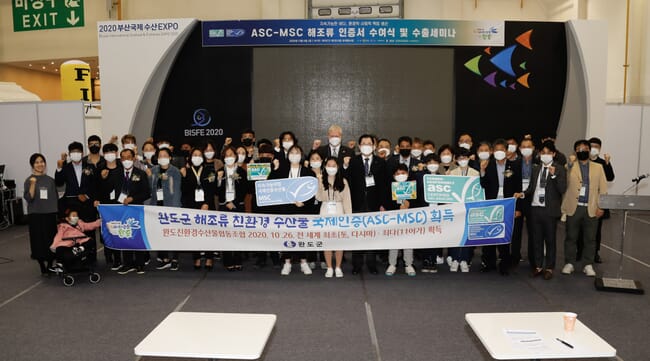
The farms, operated by Wando Eco-Friendly Seafood Cooperative (WESC), have demonstrated their commitment to responsible and sustainable production with certification against the joint ASC-MSC Seaweed Standard. WESC is the third producer in the world to achieve ASC-MSC Seaweed certification, the second in South Korea, and the first producing kelp and hiziki.
Kelp (Saccharina japonica) has been farmed in Wando since 1968 and hiziki (Hizikia fusiformis) since 1980, and seaweed farming is one of the most popular industries in this area. Members of WESC began farming the seaweeds in 2005 and are now planning to supply their certified seaweed products to retailers in Europe and Taiwan, as well as Korean supermarkets such as Orga Whole Food and Lotte Department Store.
Woo Hyun-Kyu, marketing director of WESC, said: “After a lot of hard work, we are now very satisfied that we are following this global standard, which has encouraged us to think about our environmental impact and the true value of seaweed products. The market for responsible seafood is young and has a lot of potential, so it was well worth engaging with and demonstrating our good practices. We will continuously update our practices to maintain the certificate.”
Aquaculture is an important element in Korea’s fisheries, with seaweed farming production accounting for 71 percent of the total aquaculture production by quantity and 20 percent in value. The latest data from the FAO estimates the republic produced 572,600 tonnes of kelp in 2018.
The new standard is the first joint standard to be created by ASC and the Marine Stewardship Council (MSC), reflecting that seaweed can be both farmed and harvested in the wild. It requires that producers minimise their environmental and social impacts, focusing on issues such as wild population stocks, disease management, energy use, good working conditions and good relationships with local communities.
Patricia Bianchi, ASC-MSC seaweed account manager, said: “As the ASC-MSC Seaweed Standard is a relatively new standard, it is so important that pioneering companies like WESC lead the way and demonstrate to others the great benefits of certification. This is a great achievement not just by WESC but by Wando County, which is an important seafood producer and has really embraced responsible production in recent years.”


